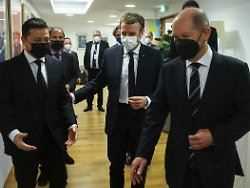Wednesday, December 15, 2021
Backing through mediation
Scholz and Macron promise help to Ukraine
Concerns about a Russian invasion keep the EU in suspense. Chancellor Scholz warns Moscow of an attack on Ukraine. Together with the French and Ukrainian heads of state, a round of mediation discussions that has hitherto been put on hold is to be revived, at best with Russia.
Germany and France have given Ukraine their backing in the conflict with Russia. After a meeting with Chancellor Olaf Scholz and French President Emmanuel Macron in Brussels, the Ukrainian head of state Volodymyr Selenskyj thanked both of them for their support. Before leaving for his first EU summit with Ukraine and other Eastern partners, Scholz had urgently warned Russia against an attack on Ukraine. According to his spokesman, Zelenskyi emphasized after the tripartite meeting: “I hope that the Russian soldiers and weapons will be withdrawn from the Ukrainian border as soon as possible.”
According to Macron’s office, Germany and France want to step up their mediation efforts in the conflict. There will initially be further three-person meetings as long as Russia is not ready for a direct dialogue with Ukraine. Scholz, Macron and Selenskyj hoped that “a permanent solution will be found to protect the territorial unity of Ukraine”, stressed the Élysée.
Macron had called Russian President Vladimir Putin for the second time in a short time the previous evening. France and Germany had previously welcomed the mediation efforts of US President Joe Biden in the conflict, but also stressed several times that they wanted to revive the so-called Normandy format. The only Normandy summit so far in the four-way format with Putin and Zelenskyi took place in Paris at the end of 2019. In his first government statement that morning, Scholz warned Moscow against an attack on Ukraine: “Any violation of territorial integrity will come at a high price,” emphasized the SPD politician, referring to the massive Russian troop movements on the border with Ukraine.
EU holds billions in aid for Eastern partners
In addition to Scholz, the Austrian Federal Chancellor Karl Nehammer also took part for the first time in the summit of the 27 EU states with Ukraine, Georgia, the Republic of Moldova as well as Armenia and Azerbaijan. Despite the Russian threats, Nehammer again pleaded for the Nord Stream 2 pipeline to be put into operation in the Baltic Sea. It was “a geostrategic project for the whole of the EU,” stressed Nehammer. Federal Foreign Minister Annalena Baerbock had previously brought up a stop on the pipeline.
Before the summit of the so-called Eastern Partnership, EU Commission President Ursula von der Leyen released an emergency aid package of 60 million euros for the Republic of Moldova. This was intended to cushion the “consequences of rising gas prices for those most in need”, emphasized von der Leyen. The EU accuses Russia of using gas as a “weapon” against Moldova. Russia had threatened the country with a delivery stop. Moscow denied that it wanted to prevent rapprochement with the EU.
In the conflict between Armenia and Azerbaijan, the EU also pledged further aid to mine clearance and confidence-building. In the dispute over the Nagorno-Karabakh region, the two countries had fierce fighting in autumn 2020, more than 6,500 people were killed.
The EU launched the Eastern Partnership in 2009 to promote economic and democratic reforms. At the summit, the Europeans wanted to pledge further aid of 2.3 billion euros to stimulate investments in roads, fast internet connections or corona vaccination programs. Accession of the Eastern countries is currently not up for discussion. On Thursday, Scholz will take part in the regular EU summit in Brussels for the first time. There should be an initial debate about a possible tightening of economic sanctions against Russia. In addition, it is about the corona pandemic and the high energy prices.
